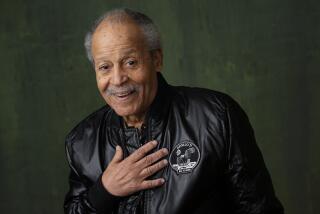Pioneer of Nuclear-Fueled Satellite Dies : Col. Jack Armstrong Also Inspired Name of Radio Hero of ‘30s
- Share via
Jack L. Armstrong, an Air Force colonel who pioneered the use of nuclear energy in space and whose name was the inspiration for the “All American Boy” radio hero of the 1930s, died Monday in Laguna Niguel after a long illness. He was 74.
During a 21-year military career, Armstrong was a prominent advocate of the non-military uses of atomic power. He played a key role in developing programs that led to the launching of the nation’s first nuclear-fueled satellite in 1961.
Following his retirement from the Air Force the same year, Armstrong worked for the Rocketdyne Division of North American Rockwell (now Rockwell International) in Los Angeles and helped develop the powerful engines that were later used in the Apollo and Gemini space programs, according to his son, James.
Remembered for Moniker
However, the much-decorated officer is best remembered by his name--a catchy moniker that became familiar to millions of radio listeners as “Jack Armstrong: The All-American Boy.”
During the early 1930s, General Mills advertising executives wanted to develop a radio show hero who would somehow represent “All-American virtues . . . of courage, a sense of humor and the championing of ideals,” said James Armstrong.
“Sammy Gale, a company executive, had been a roommate in college of my father’s, and he decided to use the name ‘Jack Armstrong’ because it seemed to convey all of that,” he added.
Like the Wheaties-eating hero named after him, Armstrong saw combat action all over the world. He entered the Army Air Forces as a 2nd lieutenant in July, 1941, and was stationed at Pearl Harbor at the outbreak of World War II.
After the war, Armstrong was assigned by the Air Force to the newly formed Atomic Energy Commission. Rising to the rank of colonel, he began developing programs such as SNAP (Systems for Nuclear Auxiliary Power) that eventually led to the launching of the nation’s first atomic-powered satellite.
Often at Space Center
Armstrong’s work with the space program frequently brought him to the National Aeronautics and Space Administration (NASA) center in Houston, where he “was often on television . . . . I always remember watching him at the space center, in that room with all the technicians and the many television screens,” said James. “He was involved with many of those programs, from the first launches to the moon landing programs . . . . I think I have more memorabilia from the astronauts, more autographs from individual astronauts, than anyone,” he added.
Armstrong grew up in Minneapolis and received a degree in civil engineering from the University of Minnesota in 1933.
He is survived by his wife, Audrey, his son, and his mother, Evelyn Armstrong.
Memorial services are scheduled for Thursday at 11 a.m. at the United Methodist Church in South Laguna. The services will be followed by full military honors at Riverside National Cemetery at 3 p.m.
More to Read
Sign up for Essential California
The most important California stories and recommendations in your inbox every morning.
You may occasionally receive promotional content from the Los Angeles Times.












